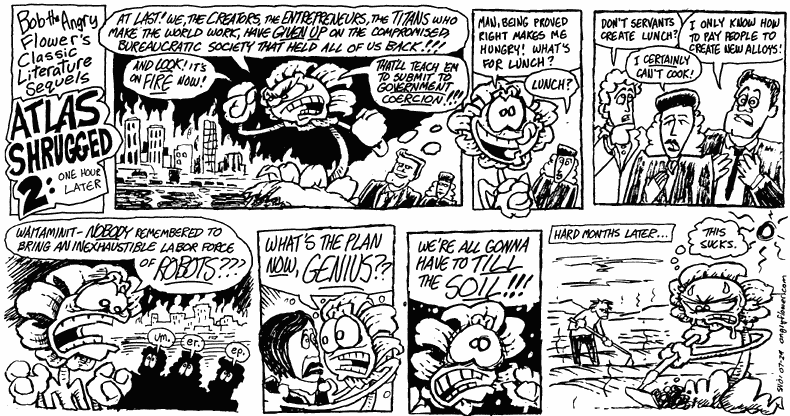This stuff is just all over the place nowadays. From
last Sunday's Hindu magazine“Our ancestors saw organic life as wholesome life,” said K. Vijayalakshmi and A.V. Balasubramaniam at the Centre for Indian Knowledge Systems, which advises farmers on organic practices and connects their products to consumers. “It's living in peace with nature and other humans, giving back what you take from surroundings, not eating away the capital. This perception changed in the post-industrial society. We are all children of this phenomenon.”
What is perplexing is that if these ancestors were such visionaries who knew what was best, why did they ever change when industrialism and post-industrialism came around? After all, they knew that the organic, bucolic, pastoral living was the right way, non?
I am sure said ancestors sat around saying, "Our ancestors saw non-agricultural life as wholesome life. It's living in peace without disturbing the land and other humans, eating only what you could hunt and gather, not taking much at all from the surroundings, not eating away the capital. This perception changed in the post-agricultural, post-draft animal society. We are all children of this phenomenon."
The possibly unpalatable truth is that our ancestors were just like us. When they saw something that made life easier, they latched onto it, without worrying too much about the consequences for future generations. Which is why we ended up where we did, otherwise we would've forever been in some Gandhian "paradise".
In fact, we're better off because at least we have a more systematic (although admittedly incomplete) understanding of the good and bad consequences of industrialization or what have you, and we're in a position , at least to some extent, to make deliberate choices to not make the same mistakes that our ancestors did. For the first time in 10,000 years or whatever, a significant minority of us (if not the majority) have the notion of an ethic that values all humans equally (you must ask the ancestors what they thought about their serfs), and since the late 20th century, the notion (admittedly not widespread enough) of seriously caring at a societal level about future generations.
I wish our ancestors had actually figured all this out, so that we didn't have go through the painful process of figuring out some of these things via trial and error, but they were largely superstitious bigots who did the best they could. There's not telling (yet) if we're any better, but our attempts are definitely more solidly grounded.
During the
Indian Constituent Assembly debates, in response to attempts to sanctify the village as the ideal unit for Indian democracy, Ambedkar nailed it like so:
The love of the intellectual Indian for the village community is of course infinite, if not pathetic …What is a village but a sink of localism, a den of ignorance, narrow mindedness and communalism?
A somewhat tangential disabusing of the ancestors-knew-all tack is found in
Meera Nanda's article in
Open Magazine on yoga title
Not as Old as You Think...or very Hindu either.
Addenda (5-March-2011)
Time for a pre-emptive cover-my-behind! :P Thanks to an
AWACS style email from the supremely well connected
Mami about possible ramifications etc., this clarification, in case it was not clear from preceding rant.
I am not seriously questioning the value of living in peace with nature and other humans in the here and now! That's an eminently desirable, almost tautologically desirable, and anything we can do to take better care of the environment, including organic practices, re-cycling etc. etc. is welcome. My point is that we don't need to bolster our justification for doing this with what we imagine/wish our ancestors' thought processes were like.
Sensitivity towards environment etc. isn't something we learned from our ancestors, nor is it something they were very consciously aware of. How could they, when they did not know what the industrial alternative was like? It's just the way life was for them. If any ancestors made those kind of choices, it's the
sanyasi types, not the average citizen types.
Today's sensitivity to environmental issues appears to be a mostly modern sensibility and way of thinking, which actually forces us to make certain choices about our way of life, in direct contrast to what the ancestor types would possibly have done!

